How Instagram Effectively Promotes Brands to Millennial Customers
VerifiedAdded on 2022/11/15
|62
|12389
|309
Thesis and Dissertation
AI Summary
This dissertation investigates the effectiveness of Instagram as a platform for promoting brands to millennial customers. It begins by outlining the current landscape of Instagram, its features, and the increasing importance of social media marketing. The research employs a positivism philosophy, deductive approach, descriptive design, and survey research strategy to gather primary data. The study aims to determine how Instagram's storytelling features, its ability to create customer desire, and its influence on instant gratification affect brand promotion. Through data analysis and interpretation, the dissertation identifies key strategies for brands to engage with millennial customers on Instagram, while also addressing potential issues and offering recommendations for future research. The findings reveal the significant impact of Instagram on brand promotion and customer behavior.
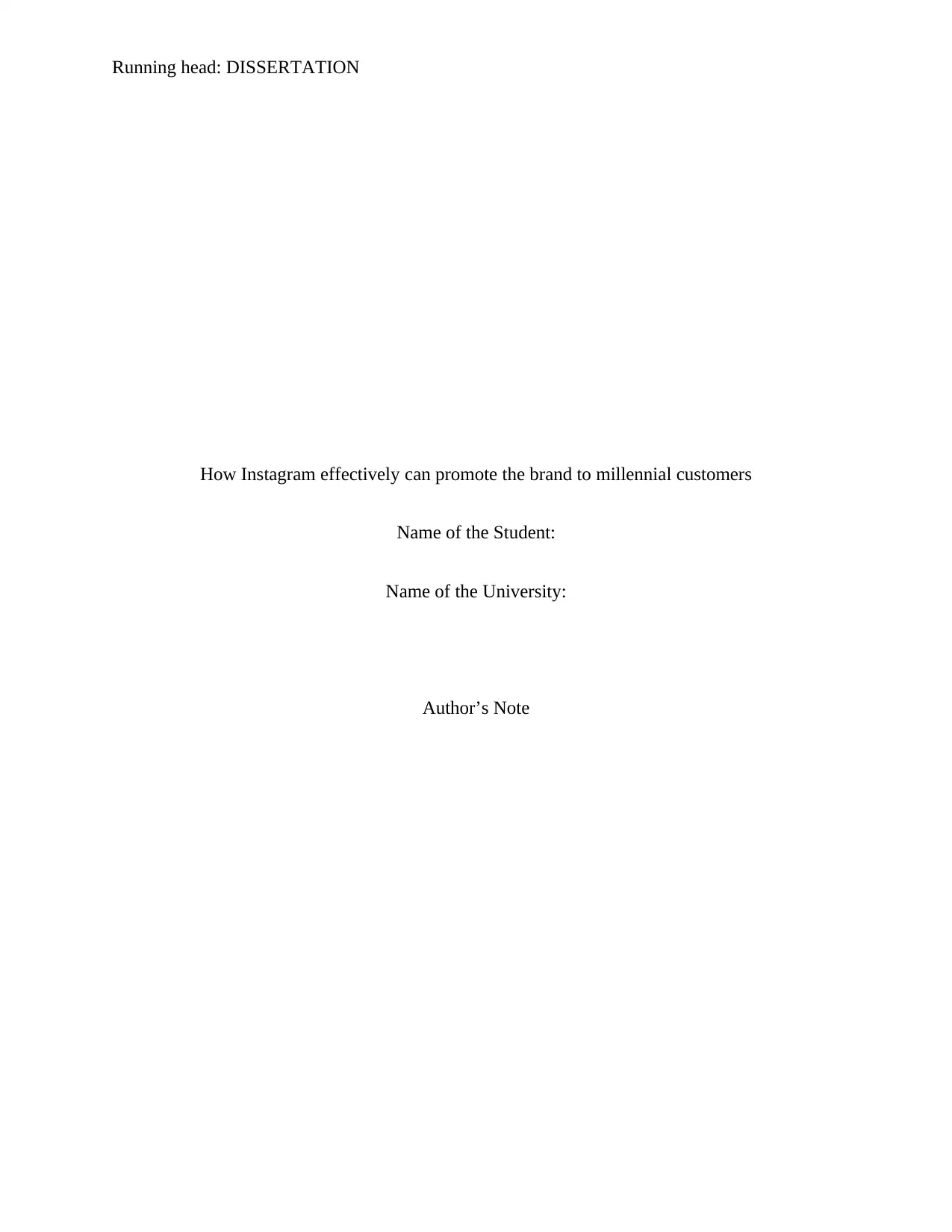
Running head: DISSERTATION
How Instagram effectively can promote the brand to millennial customers
Name of the Student:
Name of the University:
Author’s Note
How Instagram effectively can promote the brand to millennial customers
Name of the Student:
Name of the University:
Author’s Note
Paraphrase This Document
Need a fresh take? Get an instant paraphrase of this document with our AI Paraphraser
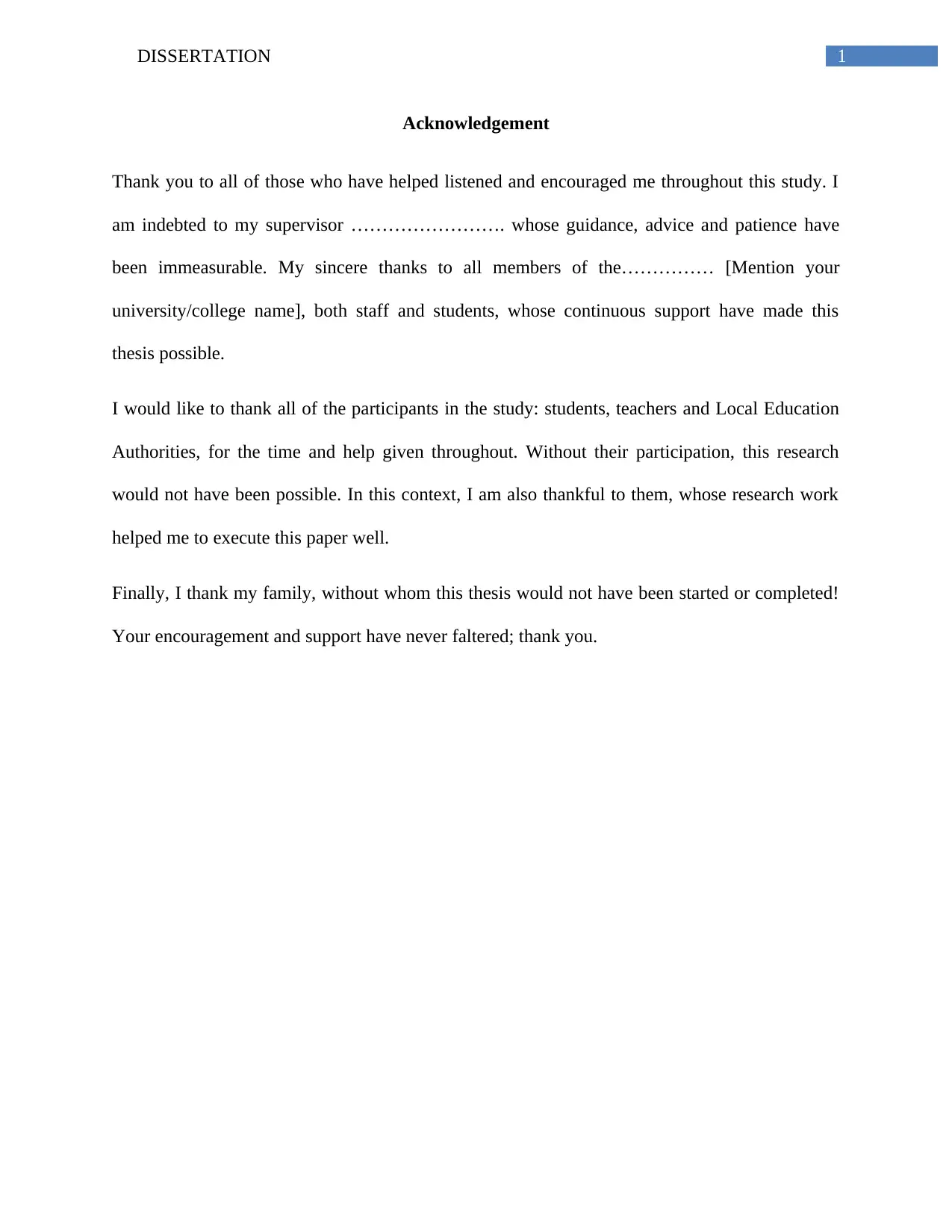
1DISSERTATION
Acknowledgement
Thank you to all of those who have helped listened and encouraged me throughout this study. I
am indebted to my supervisor ……………………. whose guidance, advice and patience have
been immeasurable. My sincere thanks to all members of the…………… [Mention your
university/college name], both staff and students, whose continuous support have made this
thesis possible.
I would like to thank all of the participants in the study: students, teachers and Local Education
Authorities, for the time and help given throughout. Without their participation, this research
would not have been possible. In this context, I am also thankful to them, whose research work
helped me to execute this paper well.
Finally, I thank my family, without whom this thesis would not have been started or completed!
Your encouragement and support have never faltered; thank you.
Acknowledgement
Thank you to all of those who have helped listened and encouraged me throughout this study. I
am indebted to my supervisor ……………………. whose guidance, advice and patience have
been immeasurable. My sincere thanks to all members of the…………… [Mention your
university/college name], both staff and students, whose continuous support have made this
thesis possible.
I would like to thank all of the participants in the study: students, teachers and Local Education
Authorities, for the time and help given throughout. Without their participation, this research
would not have been possible. In this context, I am also thankful to them, whose research work
helped me to execute this paper well.
Finally, I thank my family, without whom this thesis would not have been started or completed!
Your encouragement and support have never faltered; thank you.
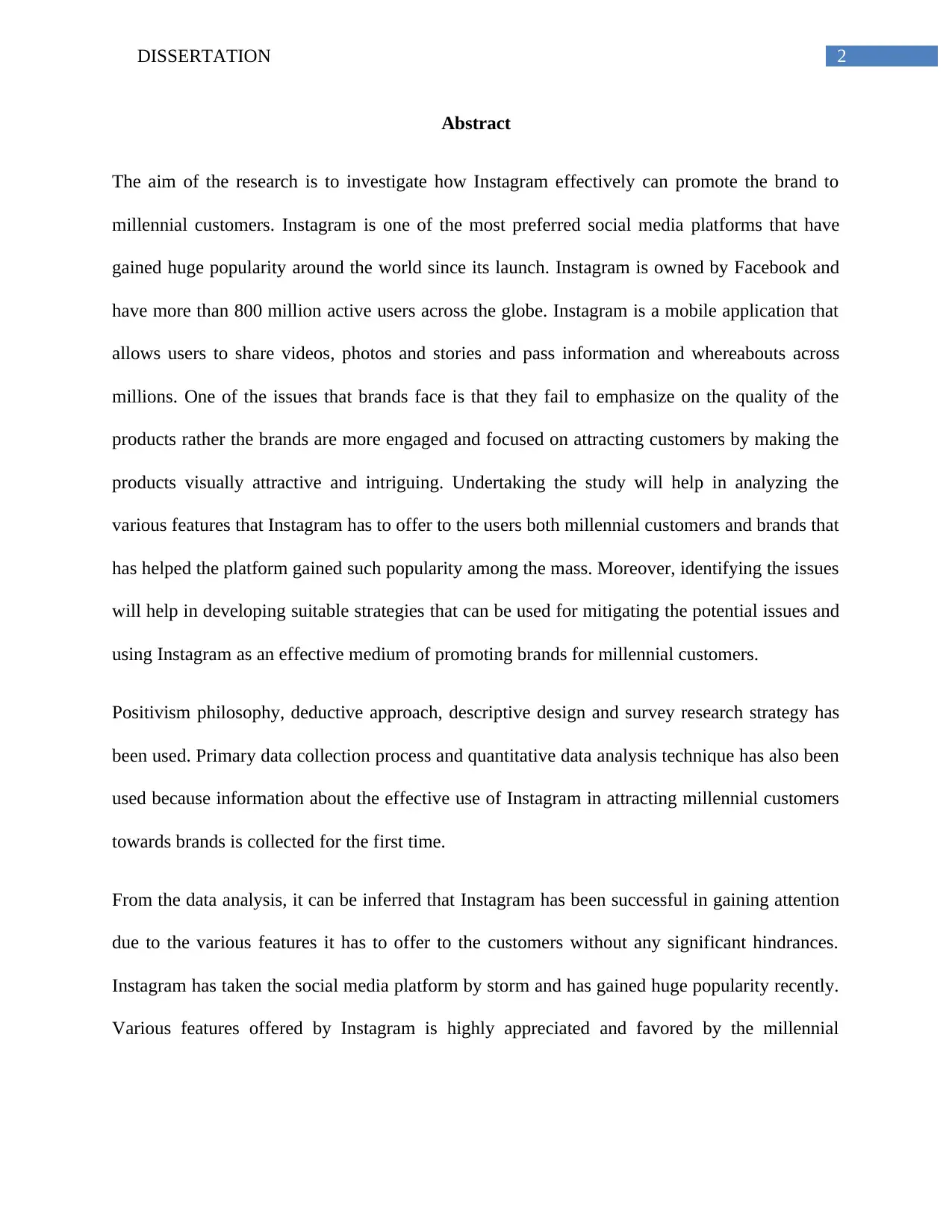
2DISSERTATION
Abstract
The aim of the research is to investigate how Instagram effectively can promote the brand to
millennial customers. Instagram is one of the most preferred social media platforms that have
gained huge popularity around the world since its launch. Instagram is owned by Facebook and
have more than 800 million active users across the globe. Instagram is a mobile application that
allows users to share videos, photos and stories and pass information and whereabouts across
millions. One of the issues that brands face is that they fail to emphasize on the quality of the
products rather the brands are more engaged and focused on attracting customers by making the
products visually attractive and intriguing. Undertaking the study will help in analyzing the
various features that Instagram has to offer to the users both millennial customers and brands that
has helped the platform gained such popularity among the mass. Moreover, identifying the issues
will help in developing suitable strategies that can be used for mitigating the potential issues and
using Instagram as an effective medium of promoting brands for millennial customers.
Positivism philosophy, deductive approach, descriptive design and survey research strategy has
been used. Primary data collection process and quantitative data analysis technique has also been
used because information about the effective use of Instagram in attracting millennial customers
towards brands is collected for the first time.
From the data analysis, it can be inferred that Instagram has been successful in gaining attention
due to the various features it has to offer to the customers without any significant hindrances.
Instagram has taken the social media platform by storm and has gained huge popularity recently.
Various features offered by Instagram is highly appreciated and favored by the millennial
Abstract
The aim of the research is to investigate how Instagram effectively can promote the brand to
millennial customers. Instagram is one of the most preferred social media platforms that have
gained huge popularity around the world since its launch. Instagram is owned by Facebook and
have more than 800 million active users across the globe. Instagram is a mobile application that
allows users to share videos, photos and stories and pass information and whereabouts across
millions. One of the issues that brands face is that they fail to emphasize on the quality of the
products rather the brands are more engaged and focused on attracting customers by making the
products visually attractive and intriguing. Undertaking the study will help in analyzing the
various features that Instagram has to offer to the users both millennial customers and brands that
has helped the platform gained such popularity among the mass. Moreover, identifying the issues
will help in developing suitable strategies that can be used for mitigating the potential issues and
using Instagram as an effective medium of promoting brands for millennial customers.
Positivism philosophy, deductive approach, descriptive design and survey research strategy has
been used. Primary data collection process and quantitative data analysis technique has also been
used because information about the effective use of Instagram in attracting millennial customers
towards brands is collected for the first time.
From the data analysis, it can be inferred that Instagram has been successful in gaining attention
due to the various features it has to offer to the customers without any significant hindrances.
Instagram has taken the social media platform by storm and has gained huge popularity recently.
Various features offered by Instagram is highly appreciated and favored by the millennial
⊘ This is a preview!⊘
Do you want full access?
Subscribe today to unlock all pages.

Trusted by 1+ million students worldwide
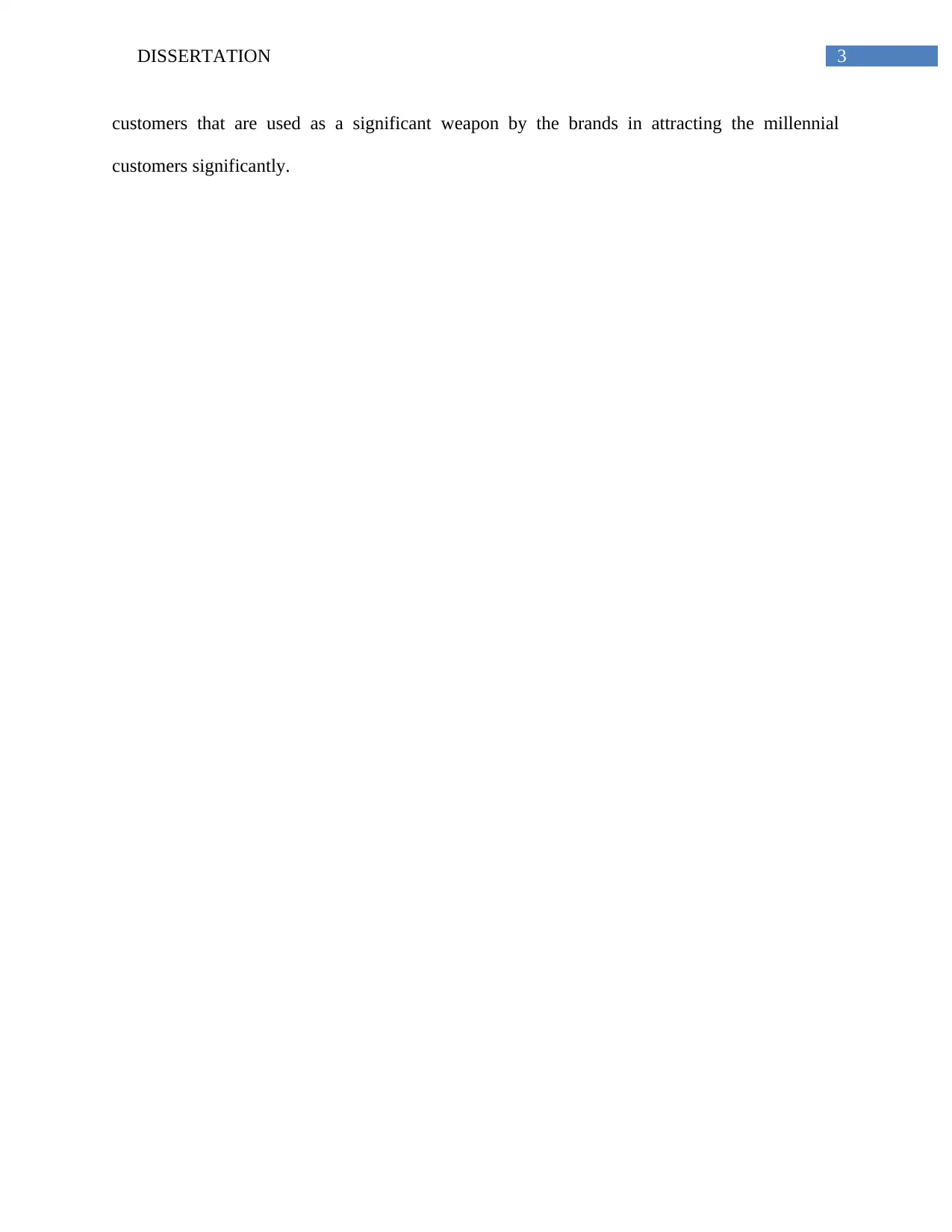
3DISSERTATION
customers that are used as a significant weapon by the brands in attracting the millennial
customers significantly.
customers that are used as a significant weapon by the brands in attracting the millennial
customers significantly.
Paraphrase This Document
Need a fresh take? Get an instant paraphrase of this document with our AI Paraphraser
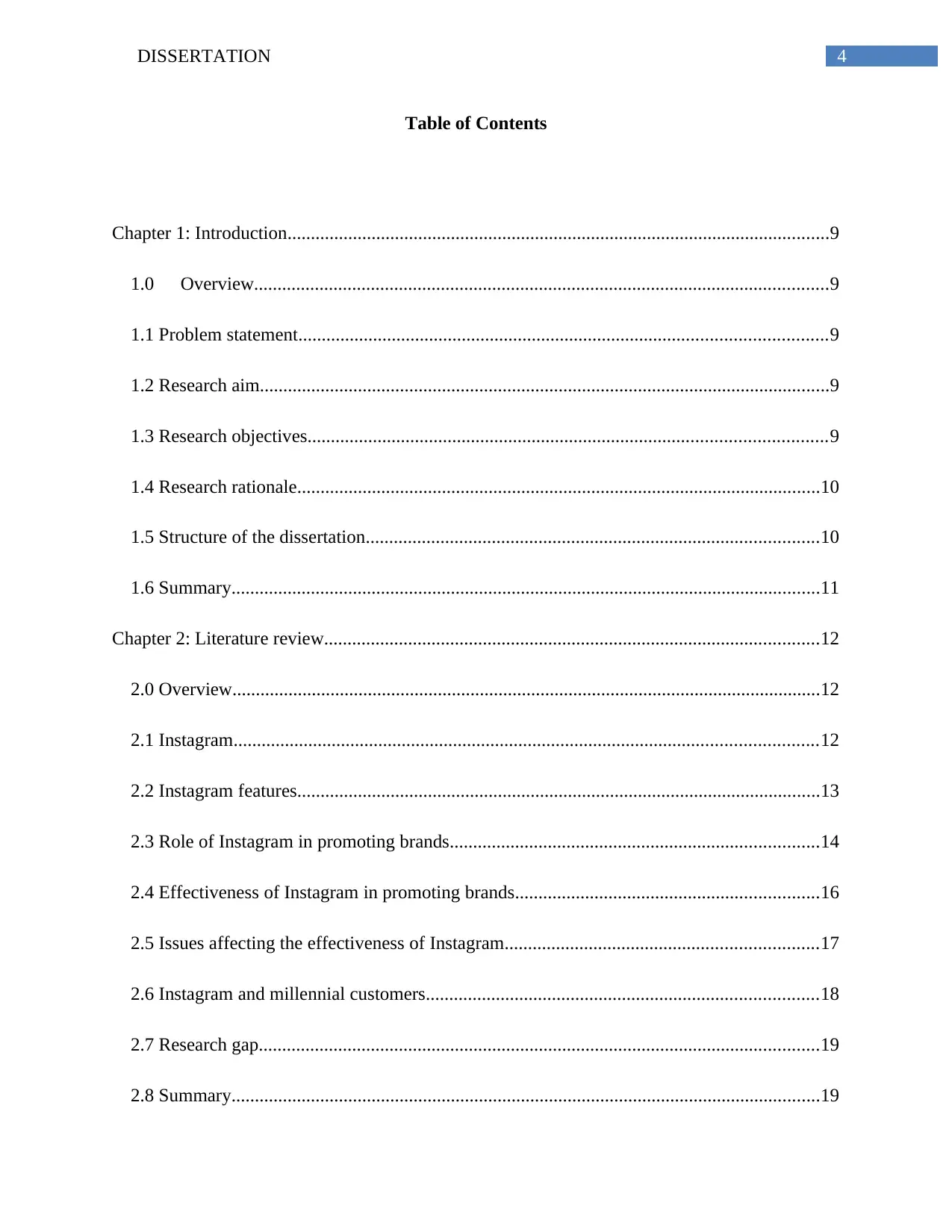
4DISSERTATION
Table of Contents
Chapter 1: Introduction....................................................................................................................9
1.0 Overview...........................................................................................................................9
1.1 Problem statement.................................................................................................................9
1.2 Research aim..........................................................................................................................9
1.3 Research objectives...............................................................................................................9
1.4 Research rationale................................................................................................................10
1.5 Structure of the dissertation.................................................................................................10
1.6 Summary..............................................................................................................................11
Chapter 2: Literature review..........................................................................................................12
2.0 Overview..............................................................................................................................12
2.1 Instagram.............................................................................................................................12
2.2 Instagram features................................................................................................................13
2.3 Role of Instagram in promoting brands...............................................................................14
2.4 Effectiveness of Instagram in promoting brands.................................................................16
2.5 Issues affecting the effectiveness of Instagram...................................................................17
2.6 Instagram and millennial customers....................................................................................18
2.7 Research gap........................................................................................................................19
2.8 Summary..............................................................................................................................19
Table of Contents
Chapter 1: Introduction....................................................................................................................9
1.0 Overview...........................................................................................................................9
1.1 Problem statement.................................................................................................................9
1.2 Research aim..........................................................................................................................9
1.3 Research objectives...............................................................................................................9
1.4 Research rationale................................................................................................................10
1.5 Structure of the dissertation.................................................................................................10
1.6 Summary..............................................................................................................................11
Chapter 2: Literature review..........................................................................................................12
2.0 Overview..............................................................................................................................12
2.1 Instagram.............................................................................................................................12
2.2 Instagram features................................................................................................................13
2.3 Role of Instagram in promoting brands...............................................................................14
2.4 Effectiveness of Instagram in promoting brands.................................................................16
2.5 Issues affecting the effectiveness of Instagram...................................................................17
2.6 Instagram and millennial customers....................................................................................18
2.7 Research gap........................................................................................................................19
2.8 Summary..............................................................................................................................19
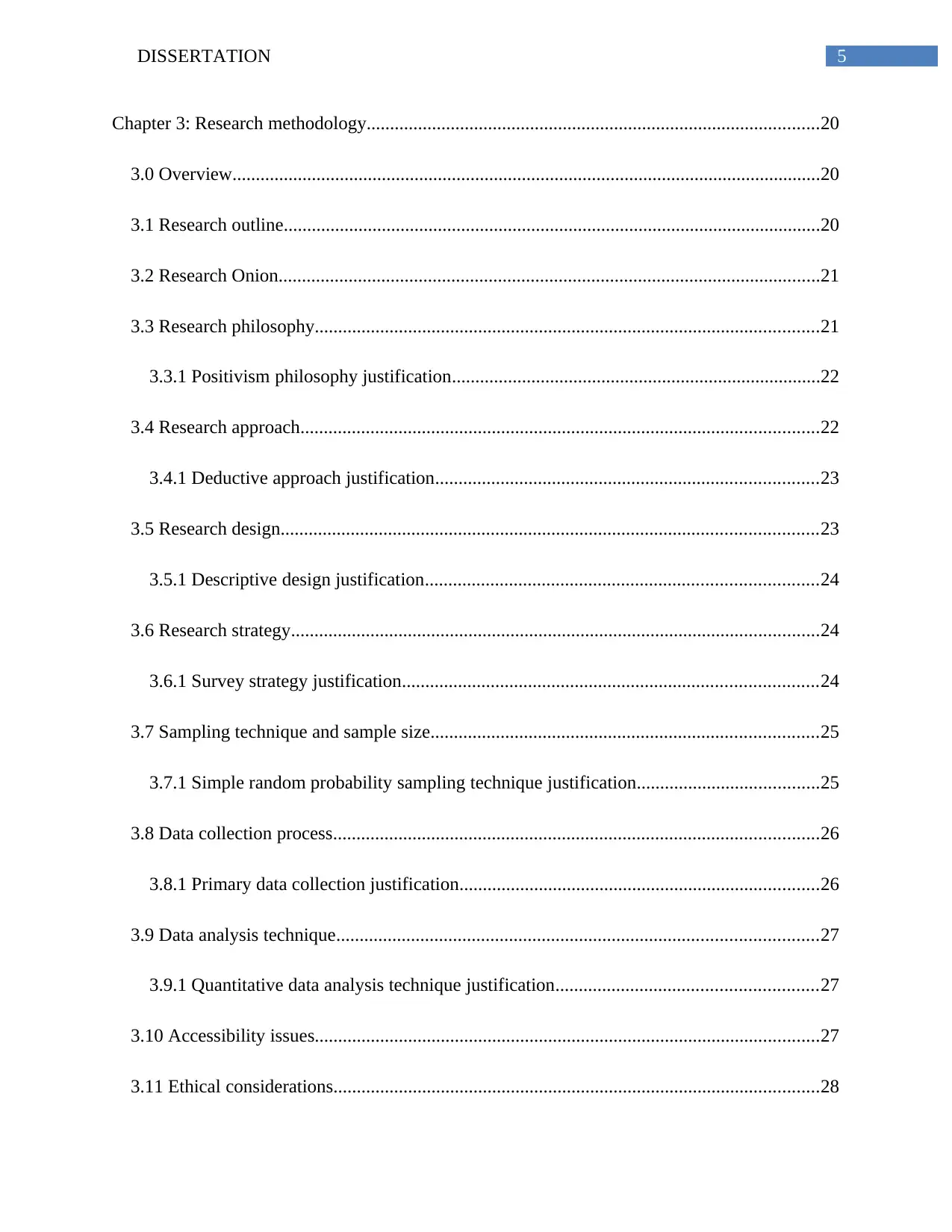
5DISSERTATION
Chapter 3: Research methodology.................................................................................................20
3.0 Overview..............................................................................................................................20
3.1 Research outline...................................................................................................................20
3.2 Research Onion....................................................................................................................21
3.3 Research philosophy............................................................................................................21
3.3.1 Positivism philosophy justification...............................................................................22
3.4 Research approach...............................................................................................................22
3.4.1 Deductive approach justification..................................................................................23
3.5 Research design...................................................................................................................23
3.5.1 Descriptive design justification....................................................................................24
3.6 Research strategy.................................................................................................................24
3.6.1 Survey strategy justification.........................................................................................24
3.7 Sampling technique and sample size...................................................................................25
3.7.1 Simple random probability sampling technique justification.......................................25
3.8 Data collection process........................................................................................................26
3.8.1 Primary data collection justification.............................................................................26
3.9 Data analysis technique.......................................................................................................27
3.9.1 Quantitative data analysis technique justification........................................................27
3.10 Accessibility issues............................................................................................................27
3.11 Ethical considerations........................................................................................................28
Chapter 3: Research methodology.................................................................................................20
3.0 Overview..............................................................................................................................20
3.1 Research outline...................................................................................................................20
3.2 Research Onion....................................................................................................................21
3.3 Research philosophy............................................................................................................21
3.3.1 Positivism philosophy justification...............................................................................22
3.4 Research approach...............................................................................................................22
3.4.1 Deductive approach justification..................................................................................23
3.5 Research design...................................................................................................................23
3.5.1 Descriptive design justification....................................................................................24
3.6 Research strategy.................................................................................................................24
3.6.1 Survey strategy justification.........................................................................................24
3.7 Sampling technique and sample size...................................................................................25
3.7.1 Simple random probability sampling technique justification.......................................25
3.8 Data collection process........................................................................................................26
3.8.1 Primary data collection justification.............................................................................26
3.9 Data analysis technique.......................................................................................................27
3.9.1 Quantitative data analysis technique justification........................................................27
3.10 Accessibility issues............................................................................................................27
3.11 Ethical considerations........................................................................................................28
⊘ This is a preview!⊘
Do you want full access?
Subscribe today to unlock all pages.

Trusted by 1+ million students worldwide
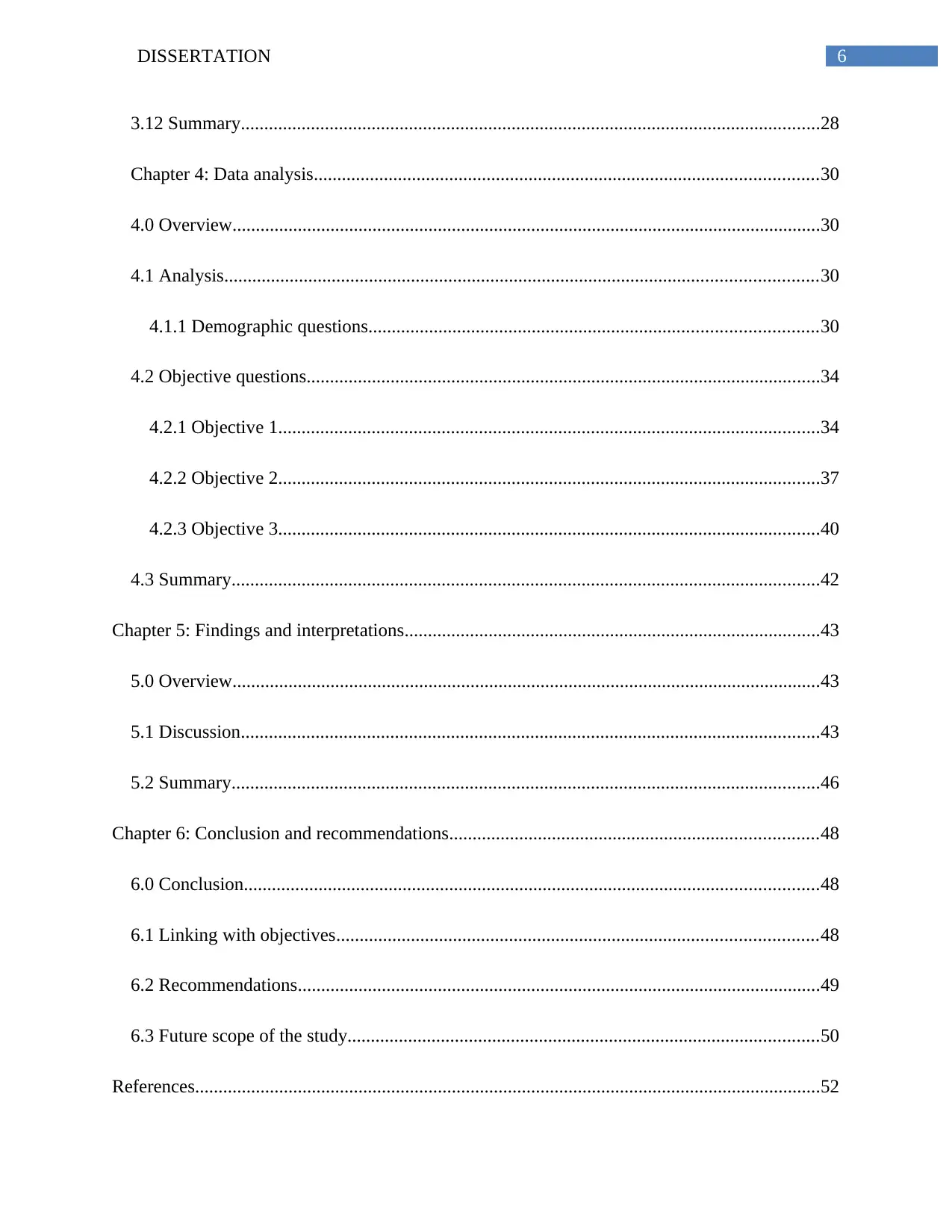
6DISSERTATION
3.12 Summary............................................................................................................................28
Chapter 4: Data analysis............................................................................................................30
4.0 Overview..............................................................................................................................30
4.1 Analysis...............................................................................................................................30
4.1.1 Demographic questions................................................................................................30
4.2 Objective questions..............................................................................................................34
4.2.1 Objective 1....................................................................................................................34
4.2.2 Objective 2....................................................................................................................37
4.2.3 Objective 3....................................................................................................................40
4.3 Summary..............................................................................................................................42
Chapter 5: Findings and interpretations.........................................................................................43
5.0 Overview..............................................................................................................................43
5.1 Discussion............................................................................................................................43
5.2 Summary..............................................................................................................................46
Chapter 6: Conclusion and recommendations...............................................................................48
6.0 Conclusion...........................................................................................................................48
6.1 Linking with objectives.......................................................................................................48
6.2 Recommendations................................................................................................................49
6.3 Future scope of the study.....................................................................................................50
References......................................................................................................................................52
3.12 Summary............................................................................................................................28
Chapter 4: Data analysis............................................................................................................30
4.0 Overview..............................................................................................................................30
4.1 Analysis...............................................................................................................................30
4.1.1 Demographic questions................................................................................................30
4.2 Objective questions..............................................................................................................34
4.2.1 Objective 1....................................................................................................................34
4.2.2 Objective 2....................................................................................................................37
4.2.3 Objective 3....................................................................................................................40
4.3 Summary..............................................................................................................................42
Chapter 5: Findings and interpretations.........................................................................................43
5.0 Overview..............................................................................................................................43
5.1 Discussion............................................................................................................................43
5.2 Summary..............................................................................................................................46
Chapter 6: Conclusion and recommendations...............................................................................48
6.0 Conclusion...........................................................................................................................48
6.1 Linking with objectives.......................................................................................................48
6.2 Recommendations................................................................................................................49
6.3 Future scope of the study.....................................................................................................50
References......................................................................................................................................52
Paraphrase This Document
Need a fresh take? Get an instant paraphrase of this document with our AI Paraphraser
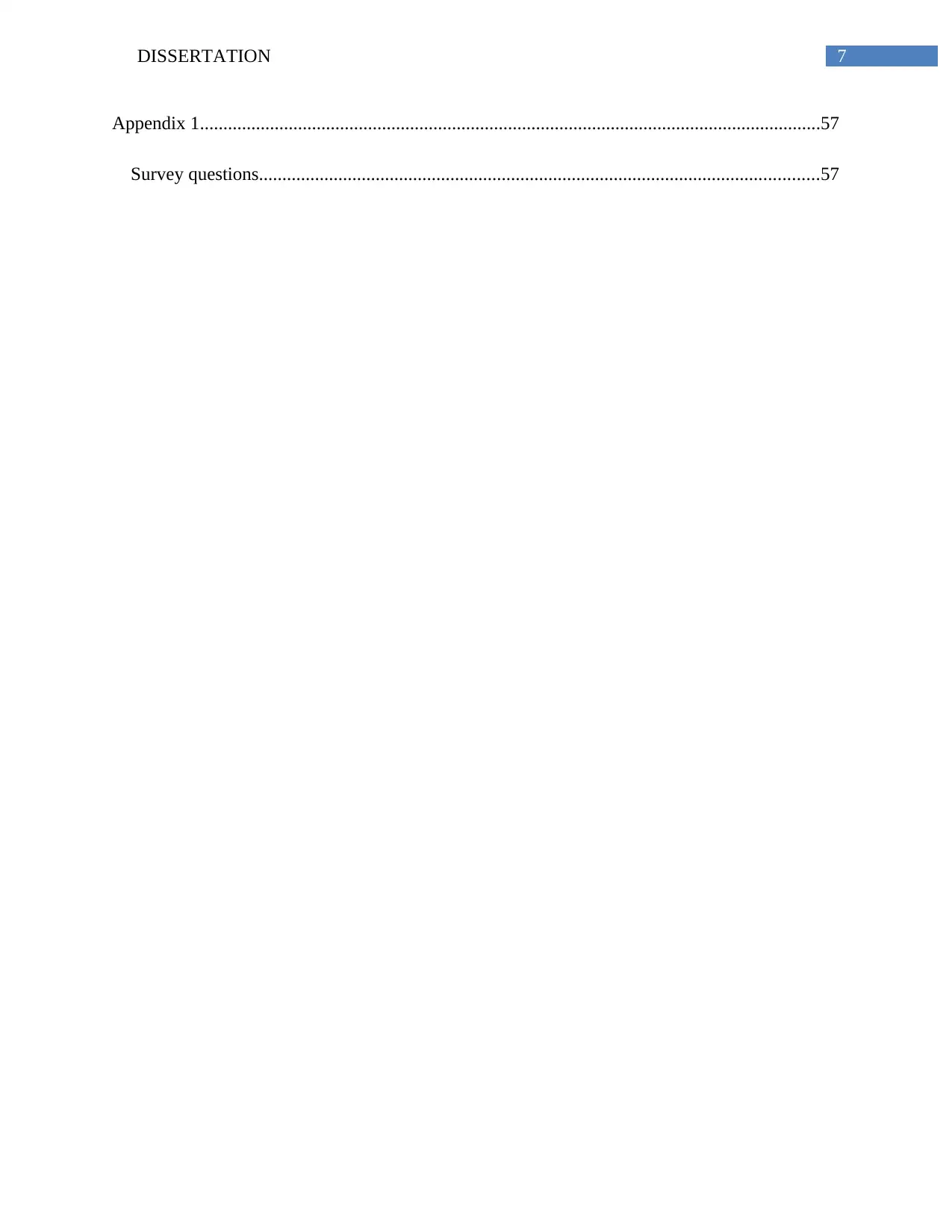
7DISSERTATION
Appendix 1.....................................................................................................................................57
Survey questions........................................................................................................................57
Appendix 1.....................................................................................................................................57
Survey questions........................................................................................................................57
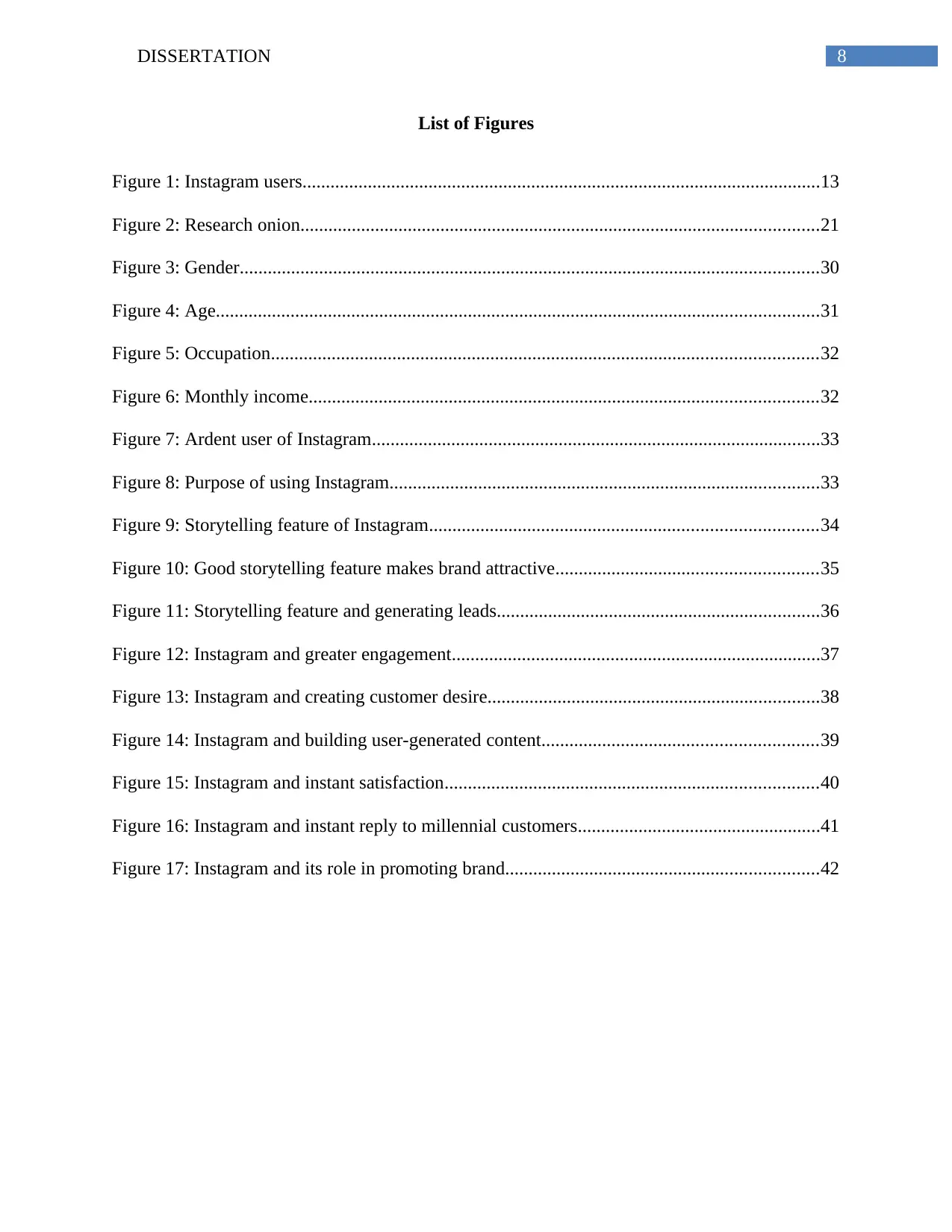
8DISSERTATION
List of Figures
Figure 1: Instagram users...............................................................................................................13
Figure 2: Research onion...............................................................................................................21
Figure 3: Gender............................................................................................................................30
Figure 4: Age.................................................................................................................................31
Figure 5: Occupation.....................................................................................................................32
Figure 6: Monthly income.............................................................................................................32
Figure 7: Ardent user of Instagram................................................................................................33
Figure 8: Purpose of using Instagram............................................................................................33
Figure 9: Storytelling feature of Instagram...................................................................................34
Figure 10: Good storytelling feature makes brand attractive........................................................35
Figure 11: Storytelling feature and generating leads.....................................................................36
Figure 12: Instagram and greater engagement...............................................................................37
Figure 13: Instagram and creating customer desire.......................................................................38
Figure 14: Instagram and building user-generated content...........................................................39
Figure 15: Instagram and instant satisfaction................................................................................40
Figure 16: Instagram and instant reply to millennial customers....................................................41
Figure 17: Instagram and its role in promoting brand...................................................................42
List of Figures
Figure 1: Instagram users...............................................................................................................13
Figure 2: Research onion...............................................................................................................21
Figure 3: Gender............................................................................................................................30
Figure 4: Age.................................................................................................................................31
Figure 5: Occupation.....................................................................................................................32
Figure 6: Monthly income.............................................................................................................32
Figure 7: Ardent user of Instagram................................................................................................33
Figure 8: Purpose of using Instagram............................................................................................33
Figure 9: Storytelling feature of Instagram...................................................................................34
Figure 10: Good storytelling feature makes brand attractive........................................................35
Figure 11: Storytelling feature and generating leads.....................................................................36
Figure 12: Instagram and greater engagement...............................................................................37
Figure 13: Instagram and creating customer desire.......................................................................38
Figure 14: Instagram and building user-generated content...........................................................39
Figure 15: Instagram and instant satisfaction................................................................................40
Figure 16: Instagram and instant reply to millennial customers....................................................41
Figure 17: Instagram and its role in promoting brand...................................................................42
⊘ This is a preview!⊘
Do you want full access?
Subscribe today to unlock all pages.

Trusted by 1+ million students worldwide
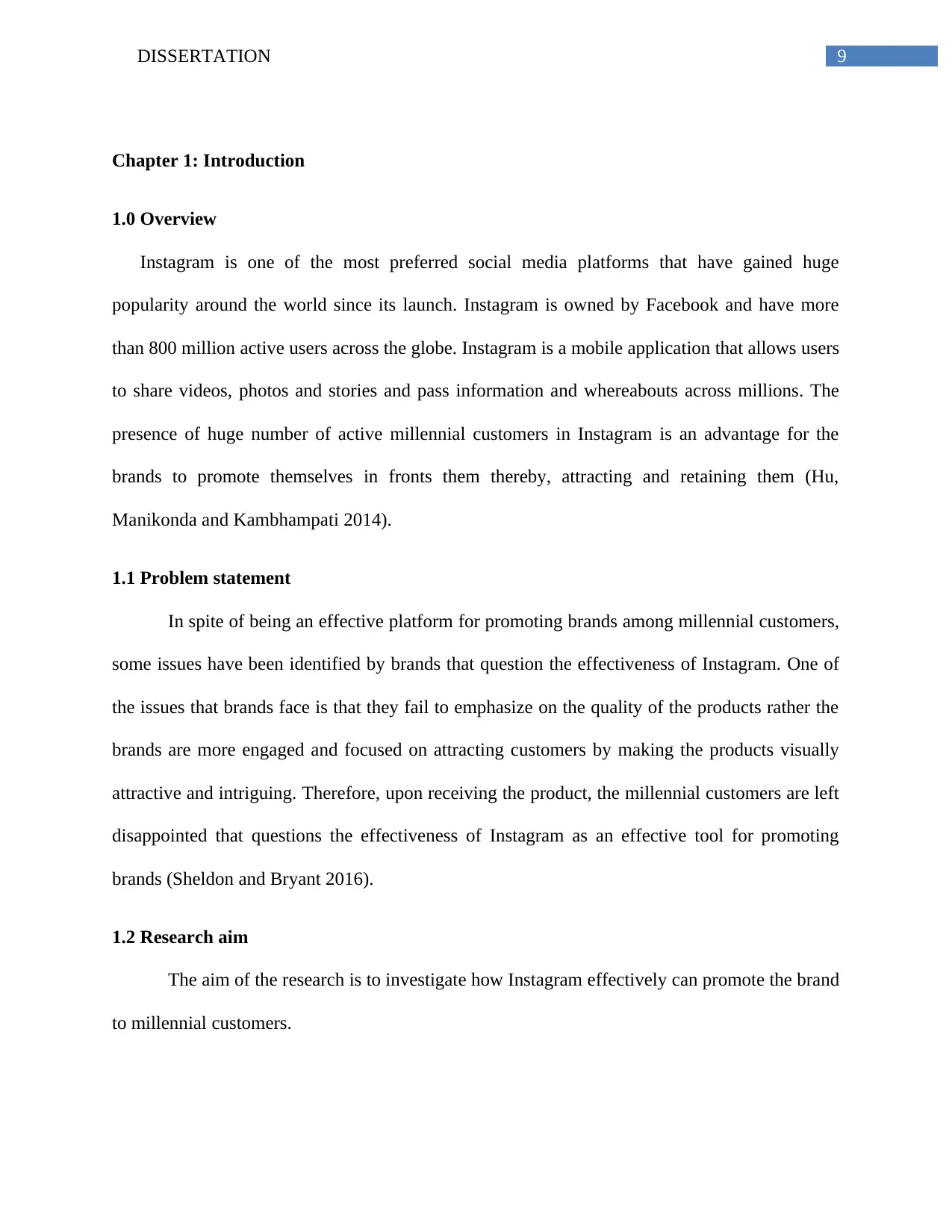
9DISSERTATION
Chapter 1: Introduction
1.0 Overview
Instagram is one of the most preferred social media platforms that have gained huge
popularity around the world since its launch. Instagram is owned by Facebook and have more
than 800 million active users across the globe. Instagram is a mobile application that allows users
to share videos, photos and stories and pass information and whereabouts across millions. The
presence of huge number of active millennial customers in Instagram is an advantage for the
brands to promote themselves in fronts them thereby, attracting and retaining them (Hu,
Manikonda and Kambhampati 2014).
1.1 Problem statement
In spite of being an effective platform for promoting brands among millennial customers,
some issues have been identified by brands that question the effectiveness of Instagram. One of
the issues that brands face is that they fail to emphasize on the quality of the products rather the
brands are more engaged and focused on attracting customers by making the products visually
attractive and intriguing. Therefore, upon receiving the product, the millennial customers are left
disappointed that questions the effectiveness of Instagram as an effective tool for promoting
brands (Sheldon and Bryant 2016).
1.2 Research aim
The aim of the research is to investigate how Instagram effectively can promote the brand
to millennial customers.
Chapter 1: Introduction
1.0 Overview
Instagram is one of the most preferred social media platforms that have gained huge
popularity around the world since its launch. Instagram is owned by Facebook and have more
than 800 million active users across the globe. Instagram is a mobile application that allows users
to share videos, photos and stories and pass information and whereabouts across millions. The
presence of huge number of active millennial customers in Instagram is an advantage for the
brands to promote themselves in fronts them thereby, attracting and retaining them (Hu,
Manikonda and Kambhampati 2014).
1.1 Problem statement
In spite of being an effective platform for promoting brands among millennial customers,
some issues have been identified by brands that question the effectiveness of Instagram. One of
the issues that brands face is that they fail to emphasize on the quality of the products rather the
brands are more engaged and focused on attracting customers by making the products visually
attractive and intriguing. Therefore, upon receiving the product, the millennial customers are left
disappointed that questions the effectiveness of Instagram as an effective tool for promoting
brands (Sheldon and Bryant 2016).
1.2 Research aim
The aim of the research is to investigate how Instagram effectively can promote the brand
to millennial customers.
Paraphrase This Document
Need a fresh take? Get an instant paraphrase of this document with our AI Paraphraser
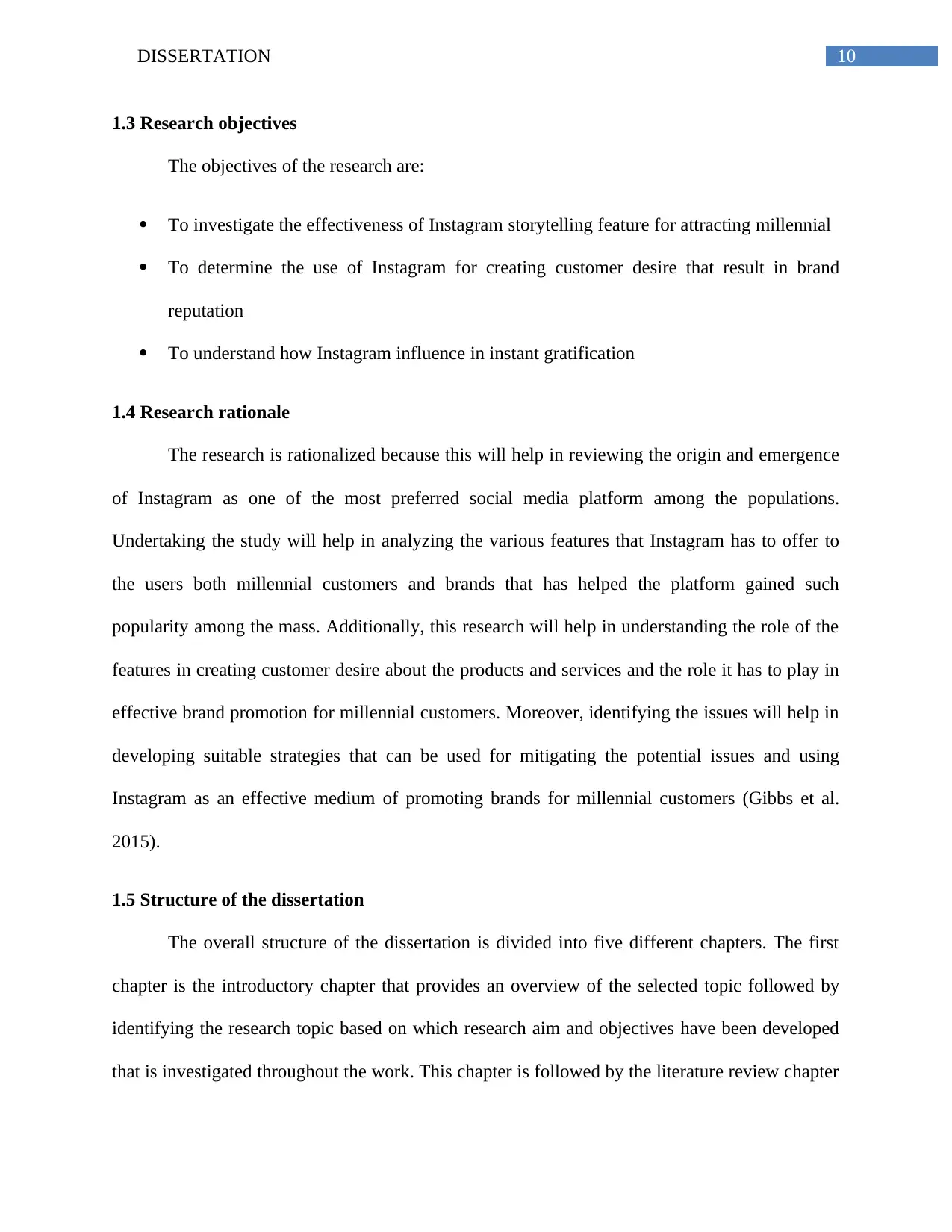
10DISSERTATION
1.3 Research objectives
The objectives of the research are:
To investigate the effectiveness of Instagram storytelling feature for attracting millennial
To determine the use of Instagram for creating customer desire that result in brand
reputation
To understand how Instagram influence in instant gratification
1.4 Research rationale
The research is rationalized because this will help in reviewing the origin and emergence
of Instagram as one of the most preferred social media platform among the populations.
Undertaking the study will help in analyzing the various features that Instagram has to offer to
the users both millennial customers and brands that has helped the platform gained such
popularity among the mass. Additionally, this research will help in understanding the role of the
features in creating customer desire about the products and services and the role it has to play in
effective brand promotion for millennial customers. Moreover, identifying the issues will help in
developing suitable strategies that can be used for mitigating the potential issues and using
Instagram as an effective medium of promoting brands for millennial customers (Gibbs et al.
2015).
1.5 Structure of the dissertation
The overall structure of the dissertation is divided into five different chapters. The first
chapter is the introductory chapter that provides an overview of the selected topic followed by
identifying the research topic based on which research aim and objectives have been developed
that is investigated throughout the work. This chapter is followed by the literature review chapter
1.3 Research objectives
The objectives of the research are:
To investigate the effectiveness of Instagram storytelling feature for attracting millennial
To determine the use of Instagram for creating customer desire that result in brand
reputation
To understand how Instagram influence in instant gratification
1.4 Research rationale
The research is rationalized because this will help in reviewing the origin and emergence
of Instagram as one of the most preferred social media platform among the populations.
Undertaking the study will help in analyzing the various features that Instagram has to offer to
the users both millennial customers and brands that has helped the platform gained such
popularity among the mass. Additionally, this research will help in understanding the role of the
features in creating customer desire about the products and services and the role it has to play in
effective brand promotion for millennial customers. Moreover, identifying the issues will help in
developing suitable strategies that can be used for mitigating the potential issues and using
Instagram as an effective medium of promoting brands for millennial customers (Gibbs et al.
2015).
1.5 Structure of the dissertation
The overall structure of the dissertation is divided into five different chapters. The first
chapter is the introductory chapter that provides an overview of the selected topic followed by
identifying the research topic based on which research aim and objectives have been developed
that is investigated throughout the work. This chapter is followed by the literature review chapter
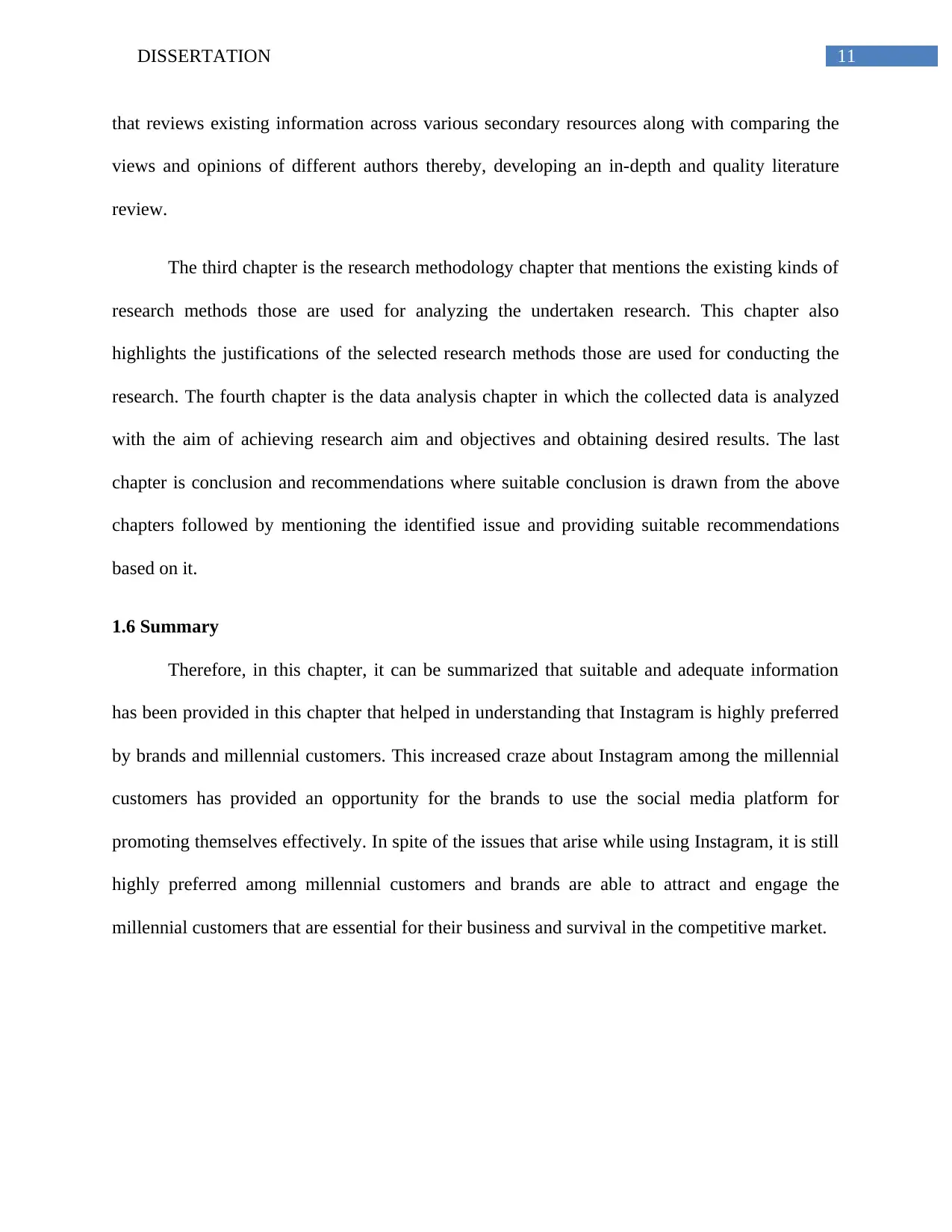
11DISSERTATION
that reviews existing information across various secondary resources along with comparing the
views and opinions of different authors thereby, developing an in-depth and quality literature
review.
The third chapter is the research methodology chapter that mentions the existing kinds of
research methods those are used for analyzing the undertaken research. This chapter also
highlights the justifications of the selected research methods those are used for conducting the
research. The fourth chapter is the data analysis chapter in which the collected data is analyzed
with the aim of achieving research aim and objectives and obtaining desired results. The last
chapter is conclusion and recommendations where suitable conclusion is drawn from the above
chapters followed by mentioning the identified issue and providing suitable recommendations
based on it.
1.6 Summary
Therefore, in this chapter, it can be summarized that suitable and adequate information
has been provided in this chapter that helped in understanding that Instagram is highly preferred
by brands and millennial customers. This increased craze about Instagram among the millennial
customers has provided an opportunity for the brands to use the social media platform for
promoting themselves effectively. In spite of the issues that arise while using Instagram, it is still
highly preferred among millennial customers and brands are able to attract and engage the
millennial customers that are essential for their business and survival in the competitive market.
that reviews existing information across various secondary resources along with comparing the
views and opinions of different authors thereby, developing an in-depth and quality literature
review.
The third chapter is the research methodology chapter that mentions the existing kinds of
research methods those are used for analyzing the undertaken research. This chapter also
highlights the justifications of the selected research methods those are used for conducting the
research. The fourth chapter is the data analysis chapter in which the collected data is analyzed
with the aim of achieving research aim and objectives and obtaining desired results. The last
chapter is conclusion and recommendations where suitable conclusion is drawn from the above
chapters followed by mentioning the identified issue and providing suitable recommendations
based on it.
1.6 Summary
Therefore, in this chapter, it can be summarized that suitable and adequate information
has been provided in this chapter that helped in understanding that Instagram is highly preferred
by brands and millennial customers. This increased craze about Instagram among the millennial
customers has provided an opportunity for the brands to use the social media platform for
promoting themselves effectively. In spite of the issues that arise while using Instagram, it is still
highly preferred among millennial customers and brands are able to attract and engage the
millennial customers that are essential for their business and survival in the competitive market.
⊘ This is a preview!⊘
Do you want full access?
Subscribe today to unlock all pages.

Trusted by 1+ million students worldwide
1 out of 62
Related Documents
Your All-in-One AI-Powered Toolkit for Academic Success.
+13062052269
info@desklib.com
Available 24*7 on WhatsApp / Email
![[object Object]](/_next/static/media/star-bottom.7253800d.svg)
Unlock your academic potential
Copyright © 2020–2026 A2Z Services. All Rights Reserved. Developed and managed by ZUCOL.





